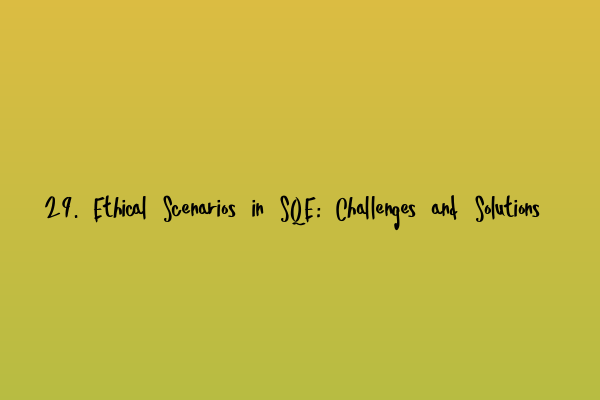29. Ethical Scenarios in SQE: Challenges and Solutions
As aspiring solicitors prepare for the Solicitors Qualifying Examination (SQE), it is important to not only have a solid understanding of legal concepts, but also to be adept at navigating ethical scenarios that may arise in practice. The SQE is designed to ensure that future solicitors possess the necessary knowledge and skills to maintain ethical standards in their legal careers. In this article, we will explore some of the common ethical challenges that may be encountered in the SQE and discuss potential solutions to overcome them.
Understanding the Importance of Ethics in the SQE
Ethics play a crucial role in the legal profession, and the Solicitors Regulation Authority (SRA) places significant emphasis on ethical conduct in the SQE. It is essential for solicitors to act ethically to protect the interests of their clients, the administration of justice, and the reputation of the legal profession as a whole. By incorporating ethical scenarios into the SQE, the SRA aims to assess candidates’ ability to apply ethical principles to real-life situations.
One of the key benefits of incorporating ethics into the SQE is that it allows candidates to demonstrate their understanding of professional responsibility. By testing a candidate’s ability to identify and resolve ethical dilemmas, the SQE aims to ensure that future solicitors possess the necessary skills to navigate ethical challenges they may encounter in practice.
Common Ethical Scenarios in the SQE
There is a wide range of ethical scenarios that may be presented in the SQE. These scenarios can cover various areas of legal practice, including client confidentiality, conflicts of interest, and maintaining professional standards.
For example, a scenario may require candidates to navigate a conflict of interest between multiple clients or to decide whether to disclose confidential information in specific circumstances. These scenarios are designed to assess a candidate’s ethical reasoning and ability to apply relevant ethical principles to complex situations.
Another common ethical scenario involves maintaining professional standards in the face of challenging clients or opposing counsel. Candidates may be required to handle situations where a client instructs them to engage in unethical conduct or where opposing counsel behaves unethically. Responding appropriately to such scenarios requires candidates to be familiar with the SRA Code of Conduct and to demonstrate their commitment to upholding professional standards.
Solutions for Ethical Challenges in the SQE
Overcoming ethical challenges in the SQE requires a combination of knowledge, critical thinking skills, and an understanding of ethical principles. Here are some key solutions for addressing ethical scenarios in the SQE:
- Thoroughly review the SRA Code of Conduct: Familiarize yourself with the principles and rules outlined in the SRA Code of Conduct. Understanding the ethical obligations imposed on solicitors is crucial for effectively addressing ethical scenarios in the SQE.
- Develop a solid understanding of key ethical concepts: Brush up on ethical principles such as integrity, confidentiality, and professional competence. Having a strong foundation in these concepts will enable you to apply them to real-life scenarios effectively.
- Practice ethical reasoning: Work through practice scenarios and discuss them with peers or mentors. This will help you develop your ethical reasoning skills and gain insight into different perspectives on ethical dilemmas.
- Stay up to date with current ethical issues: Read legal news and stay informed about recent ethical challenges that the legal profession is facing. This will broaden your exposure to various ethical scenarios and ensure that you are aware of evolving ethical standards and debates.
- Use resources and support: Take advantage of SQE webinars, expert insights, and course providers that offer guidance on ethical scenarios. These resources can help deepen your understanding of ethical challenges and provide practical tips for handling them in the SQE.
By following these solutions, candidates can enhance their ability to address ethical scenarios in the SQE effectively. Remember, ethical scenarios are designed not only to assess your knowledge of ethical principles but also to evaluate your ability to apply them in challenging situations.
To further enhance your preparation for the SQE, we recommend checking out the following related articles:
24. Unlocking Knowledge with SQE Webinars: Expert Insights at Your Fingertips
17. Review of SQE Course Providers: Choosing the Best Fit
4. Unveiling the SRA Syllabus for the SQE
31. Conquer the SQE: Insider Tips and Study Tricks for Success
Grading System in SQE: Understanding How Exams are Evaluated
In conclusion, ethical scenarios play a critical role in the SQE, challenging candidates to apply ethical principles and maintain professional standards. By understanding the importance of ethics, familiarizing yourself with key ethical concepts, and practicing ethical reasoning, you can effectively overcome ethical challenges in the SQE. Remember to take advantage of available resources and support to enhance your preparation. Best of luck in your SQE journey!
